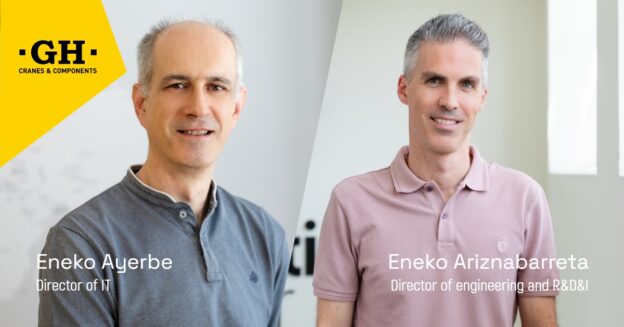Eneko Ayerbe, director of IT, and Eneko Ariznabarreta, director of Engineering and R&D&I, lead the integration of artificial intelligence at GH Cranes & Components. In this interview, they share their perspectives on the current and future impact of AI at GH.
What impact is the emergence of artificial intelligence having on GH?
Artificial intelligence is having a significant impact on GH. In internal processes, we’re seeing noticeable improvements in productivity and efficiency, and we expect these benefits to expand as we move forward with our projects. In terms of the end products, the cranes, we’re working on using AI to increase their safety. Also, on the programming side, it’s inspiring and accelerating software development, allowing us to innovate faster and more accurately.
What are the main challenges in integrating AI into our internal processes and products
One of the main challenges is ensuring the confidentiality of the data we provide to AI. We have to make sure that this information is kept secure and not shared inappropriately. We’re also finding it difficult to integrate the valuable information provided by AI into existing management processes so that it’s really useful for employees and can be applied in their daily work.
As projects develop, how many GH employees do you think will benefit from AI in the future?
For example, if we successfully implement the virtual assistant for the Technical Support Service, around one third of our employees – in other words, approximately 300 people – will benefit directly. This assistant will provide quick and accurate answers to operators, improving their efficiency and reducing their dependence on third-party knowledge.
Is there a risk that AI will replace workers at GH?
Although AI is transforming the work environment, we believe that it will complement human
skills rather than replacing them. Currently, the information provided by AI always requires supervision to ensure its accuracy. At the moment, we can’t completely trust AI to operate autonomously without human validation.
Does GH currently have AI expert profiles, or do you think it will need them in the future? We don’t currently have profiles dedicated exclusively to AI, although we do have employees with advanced knowledge in this area. In addition, we collaborate with external partners to complement our capabilities. In our specific sector, we don’t foresee the need for highly trained AI specialists, but we do consider it crucial that our staff are trained and prepared to use these technologies effectively.
How long until we see AI fully integrated into cranes?
A full integration of AI into cranes is still some time away. Safety is a critical aspect, because if a system is learning and modifying its behaviour over time, how safe will it be? To what extent can it be granted a safety certificate? The industry at large is debating how to certify the reliability of AI systems, and until this is resolved, the full implementation of AI in our cranes will remain a long-term goal.
